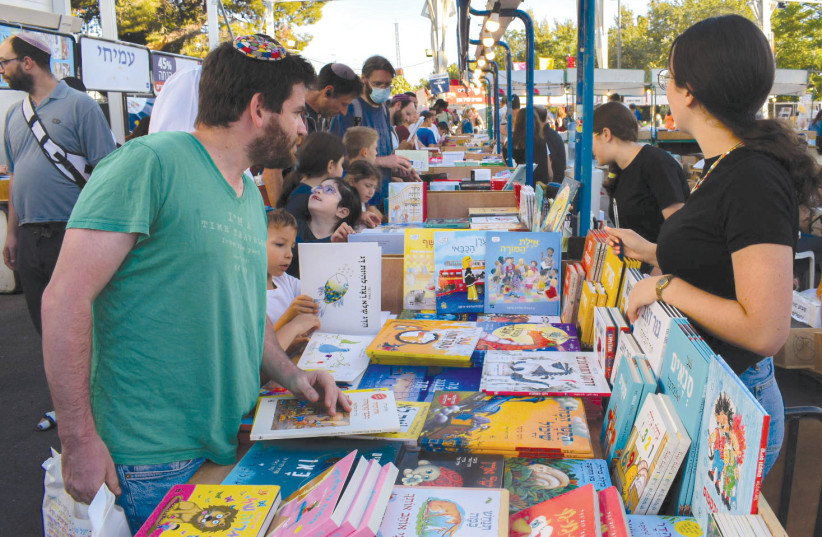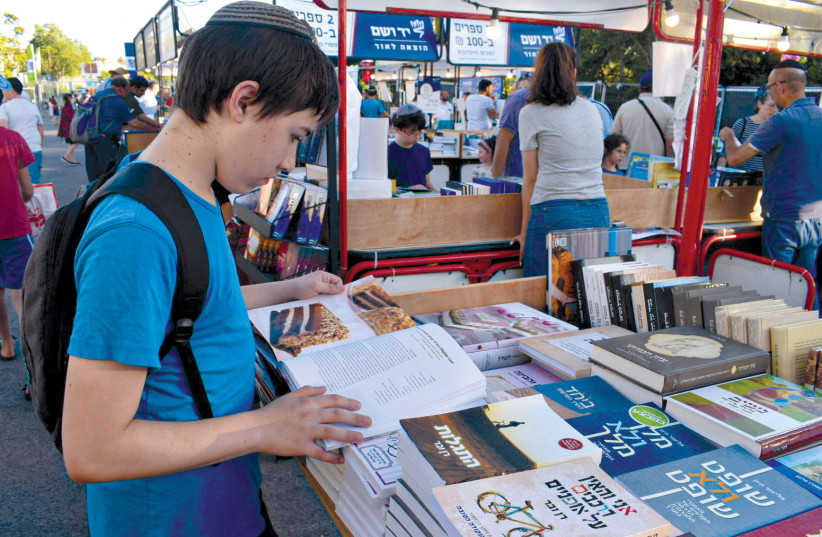A week after beloved author A.B. Yehoshua passed away, Israelis around the country helped preserve his allegiance to the written word by heading out to various venues for Hebrew Book Week.
In Jerusalem, the annual event took place throughout the week at the First Station, where on Sunday, a couple of hundred bibliophiles mingled among scores of tables manned by local book publishers featuring everything from Jewish-themed and children’s books to biographies and novels.
The scene also played itself out at Sarona in Tel Aviv. Hebrew Book Week enables consumers to purchase books directly from publishers at discounted prices. Authors also benefit since they do not have to sell their books at the lower price that bookstores pay them, said one publisher.
“People like being in an environment with other people who love books. They like to feel the books in their hands and hear from other people what is interesting, and what they want [to read],” said one sales representative.
“People like being in an environment with other people who love books. They like to feel the books in their hands and hear from other people what is interesting, and what they want [to read].”
Sales representative
The National Library of Israel reported that 7,344 printed books and 982 digital books were published in 2021 (91.4% of them in Hebrew), compared to 6,487 in 2020. In an average year, the number is around 8,000, according to the National Library.
 SCENES FROM the Hebrew Book Week display at Jerusalem’s First Station. (credit: Sydney Maud)
SCENES FROM the Hebrew Book Week display at Jerusalem’s First Station. (credit: Sydney Maud)One would assume that the COVID-19 pandemic would have led to an increase in the number of books published, since authors had time to write at home. However, the closure of publishing houses made publishing print books difficult if not impossible. As a result, readers turned to electronic books – a trend that has continued even as publishing houses have reopened.
People enjoy the return
Nonetheless, this year’s book fair felt back to normal after the two years of restricted participation, said some of the book sellers at the First Station. Maya Rockman, who manned one booth, said she was excited by the turnout this year, not only because of the waning lull in corona, but in the continued interest in the written word.
“It’s been packed because everyone was so eager to get out. It was great to see this because people don’t read as much as they used to and books are so important,” she said.
Jerusalem resident Sheimi Dvir, who has been attending Hebrew Book Week since she was a child, said she was a little apprehensive about joining such a big crowd. “It was limited entry, you needed to wait online to come inside, and we waited awhile to get in,” she said, but added that it was important for her to come.
A mother to a young boy, Dvir remembers as a child the book fair being a summer highlight and she also wants her son to also remember “the week of celebrating books.”
The event draws an abundance of children and their families to the fair, with many of the stands consisting of children’s books. The Education Ministry released a list of favorite pre-teen books, with J. K. Rowling’s Harry Potter series being among the most popular.
Lior, a salesman for National Geographic, who was targeting children and their parents with his company’s products, said that he knows he’s up against some stiff competition from outside the book world.
“Children prefer to watch TV and go on a cellphone instead of reading. However, there are families who prefer that their children read books, since they know that books offer the healthiest content for their children,” he said. “The demand has gradually increased and more children keep coming to buy National Geographic books, which have a lot of information, animals and many wonderful pictures.”
As for the future, who knows what will hold for printed books, especially with the increase in digital book sales. But Hebrew Book Week demonstrated that there’s still a demand by a tight-knit community that holds the common love of books, and the hopes of discovering the next A.B. Yehoshua. As one saleswoman said, “I know that I will always be part of this group.” ❖









































































































